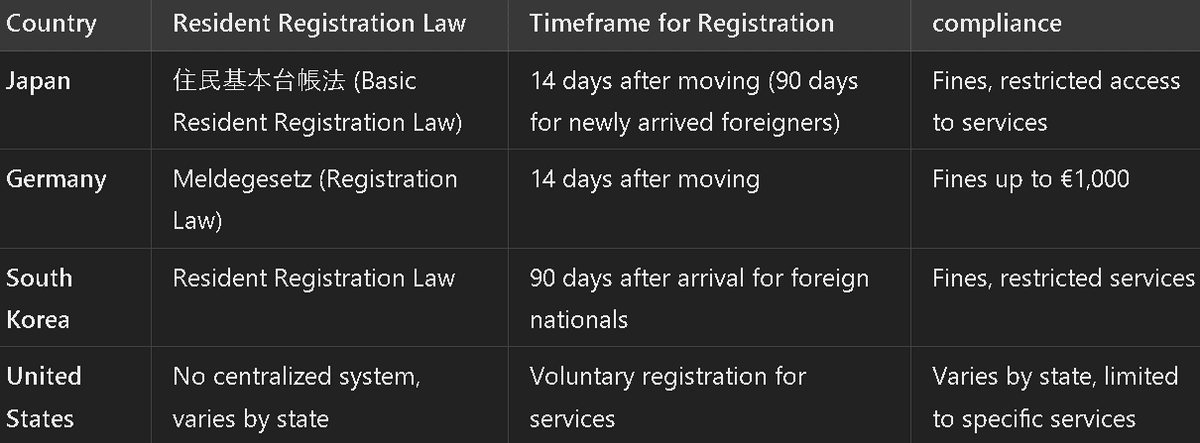
住民基本台帳法1/
#住民 #法律 #law #Chibil #Residence #ai
The 住民基本台帳法 (Basic Resident Registration Law) organizes the registration of residents in Japan, ensuring public services are accessible to all residents, including foreign nationals. This system is essential for various administrative functions, and foreign residents are expected to register after living in Japan for 90 days. Below, I outline the key elements of Japan's system and compare it globally.
Overview of the 住民基本台帳法 in Japan
Legal Classification
Type: Administrative law.
Purpose: To track residents for public administration purposes, including access to healthcare, taxation, and social services.
Applicability: All residents, including foreign nationals residing in Japan for more than 90 days, are required to register.
Historical Context
Enactment: Introduced in 1967, significantly revised in 2012 to include foreign residents within the same framework as Japanese nationals.
2012 Amendment: Foreign residents were integrated into the same registration system as Japanese citizens. Prior to this, they were tracked separately through the Alien Registration System.
Implementation and Impact
Administration: Managed by local municipal governments, the system keeps track of individuals' residency and is essential for various legal and administrative processes.
Key Functions:
Provides access to public services, healthcare, and welfare.
Facilitates taxation and voting rights (for citizens).
Supports the issuance of residency cards and legal identification.
Penalties: Non-compliance can result in fines and restricted access to essential public services.
Global Comparison of Resident Registration Laws
Similarities and Differences in Resident Registration Systems

How Japan's System Compares
United States:
Unlike Japan’s centralized system, the U.S. relies on decentralized tracking through various systems such as Social Security, tax records, and voluntary voter registration. Japan’s comprehensive system ensures better coordination of services but is more bureaucratically rigid.
Germany:
Japan and Germany have similar requirements for registration. However, Germany enforces stricter timeframes (14 days) for all residents compared to Japan’s longer window for foreign nationals (90 days after arrival).
South Korea:
Both Japan and South Korea require registration within 90 days for foreign residents, though the systems differ in some specifics regarding local identification cards and the scope of services.
Trends in Resident Registration Laws
Global Trends
Digitalization: Japan’s adoption of the My Number system aligns with trends towards digitization of resident records seen globally. This trend aims to streamline administrative processes and integrate resident data across different government departments, similar to national ID systems in countries like South Korea and parts of the EU.
Focus on Foreign Residents: Countries like Japan and Germany have adapted their systems to accommodate increasing numbers of foreign residents. Japan’s 2012 amendment exemplifies efforts to integrate foreign nationals into public services by eliminating a dual-track registration system.
Future Challenges
Data Privacy: As systems like My Number become more digitized, concerns about data privacy and cybersecurity are on the rise. Japan, like other countries, will need to strengthen data protection measures to maintain public trust.
Mobile Populations: As populations become increasingly mobile, national resident registration systems will face challenges in adapting to transient residents and frequent movers.
Advice for Foreign Residents in Japan
Register within 14 Days: After moving to a new residence, you must register within 14 days at your local city or ward office.
Keep Your Address Updated: Maintaining up-to-date information in the resident registry is crucial for accessing public services.
My Number Card: Be sure to acquire and keep your My Number card, which is necessary for various administrative processes, including tax filing and accessing healthcare.
Penalties: Failing to comply with the Basic Resident Registration Law can lead to fines and restricted access to services.
Comparison Table: Resident Registration Laws for Foreign Residents

Conclusion
Japan’s 住民基本台帳法 is essential for integrating both Japanese citizens and foreign nationals into the country’s public service framework. Its comprehensive resident registration system helps maintain efficient public administration, offering benefits and access to essential services. Compared globally, Japan’s system stands out for its centralization and thorough inclusion of foreign residents. Future trends toward digitization and the need for privacy protection will shape the evolution of such systems.
References
Ministry of Internal Affairs and Communications, Japan - Official information on Japan’s resident registration law: 総務省.
Federal Ministry of the Interior, Germany - Information on Germany’s registration laws: Germany’s Resident Registration Law.
South Korean Government - Details on South Korea's registration laws and ID system: South Korean Resident Law.
My Number System in Japan - Overview of Japan’s digitized resident number system for public administration: My Number Portal.
Yale Review of International Studies - Historical and social background on resident Koreans in Japan: Zainichi Koreans.
いいなと思ったら応援しよう!

